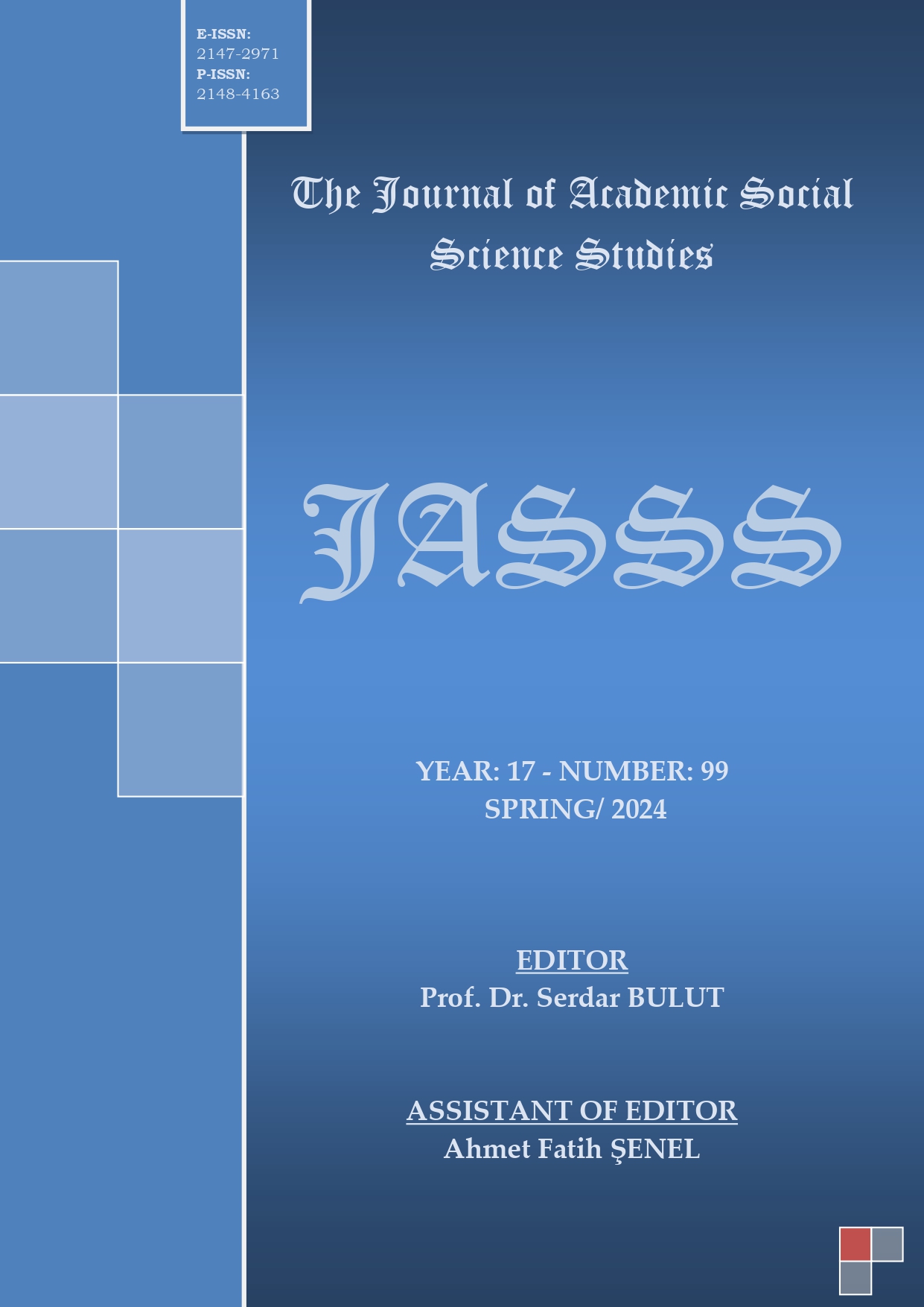Author :
Abstract
Araştırmanın temel amacı, sosyal bilgiler öğretmen adaylarının demokratik katılım düzeylerini ortaya çıkarmaktır. Bu temel amaç doğrultusunda sosyal bilgiler öğretmen adaylarının demokratik katılım düzeylerinin; öğrenim görülen üniversite, cinsiyet, öğrenim görülen sınıf düzeyi, yaşanılan bölge, ailenin yaşadığı yerleşim birimi, aile ekonomik durumu, baba öğrenim durumu, anne öğrenim durumu ve sosyal medya kullanım sıklığı değişkenlerine göre anlamlı farklılık gösterip göstermediği saptanmaya çalışılmıştır. Araştırmada nicel araştırma yöntemlerinden biri olan tarama modeli kullanılmıştır. Araştırmanın örnekleminin belirlenmesinde kolay ulaşılabilir durum örneklemesi kullanılmıştır. Araştırmanın örneklemini, 2021-2022 eğitim öğretim yılında Bolu Abant İzzet Baysal Üniversitesi, Kastamonu Üniversitesi, Afyon Kocatepe Üniversitesi, Gazi Üniversitesi, Uludağ Üniversitesi, Sakarya Üniversitesi ve Akdeniz Üniversitesinde 1., 2., 3. ve 4. sınıf düzeyinde öğrenim gören toplam 882 sosyal bilgiler öğretmen adayı oluşturmaktadır. Araştırmanın verileri, Keçe ve Dinç tarafından geliştirilen "Demokratik Katılım Ölçeği" kullanılarak elde edilmiştir. Elde edilen verilerin analizinde betimsel istatistikler, "Kolmogorov-Simirnov", "Shapiro-Wilk", "Mann Whitney U" ve "Kruskal Wallis H" testlerinden yararlanılmıştır. Demokratik katılım ölçeğinin tüm boyut ve alt boyutlarında; yaşanılan bölge, ailenin yaşadığı yerleşim birimi, anne eğitim durumu, baba eğitim durumu değişkenlerine göre istatistiksel olarak anlamlı bir farklılık görülmemiştir. Ölçeğin bazı boyut ve alt boyutlarında; öğrenim görülen üniversite, cinsiyet, sınıf düzeyi, aile ekonomik durumu ve sosyal medya kullanım sıklığı değişkenlerine göre ise istatistiksel olarak anlamlı bir farklılık görülmüştür. Araştırmanın sonuçları doğrultusunda yapılacak araştırmalara ve araştırmacılara çeşitli önerilerde bulunulmuştur.
Keywords
Abstract
The main purpose of the research is to reveal the democratic participation level of social studies teacher candidates. In line with this main purpose, it was tried to determine whether there were any significant differences on democratic participation of social studies teacher candidates depending on factors which are university, gender, grade level, region of residence, residential area of the family, economic status of the family, father's education level, mother's education level and frequency of social media use. The survey model, one of the quantitative research method, was used in the research. Easily accessible case sampling was used to determine t he sample of the research. The sample of the research is composed of a total of 882 social studies teacher candidates who are 1st, 2nd, 3rd and 4 th grade student at 2021 2022 academic year at Bolu Abant İzzet Baysal University, Kastamonu University, Afyon Kocatepe University, Gazi University, Uludağ University, Sakarya University and Akdeniz University. The data of the research were obtained with the " Democratic Participation Scale " developed by Keçe and Dinç. In the phase of data analysis; “descriptive statistics”, "Kolmogorov Smirnov", "Shapiro Wilk", "Mann Whitney U" and "Kruskal Wallis H" tests were In all dimensions and sub
dimensions of the democratic participation scale; no valuable statistical difference was observed depending on factors which are region of residence, residential area of family, mothers's education level, father's education level. In some dimensions and sub dimensions of scale, it was concluded that there are significant statistical differences depending on factors which are uni versity, gender, grade, economic situation of family and frequency of social media use. Suggestions were made for further research which will and frequency of social media use. Suggestions were made for further research which will be conducted in line with the results of the study and for researchers who will conduct be conducted in line with the results of the study and for researchers who will conduct these researches.these researches.





